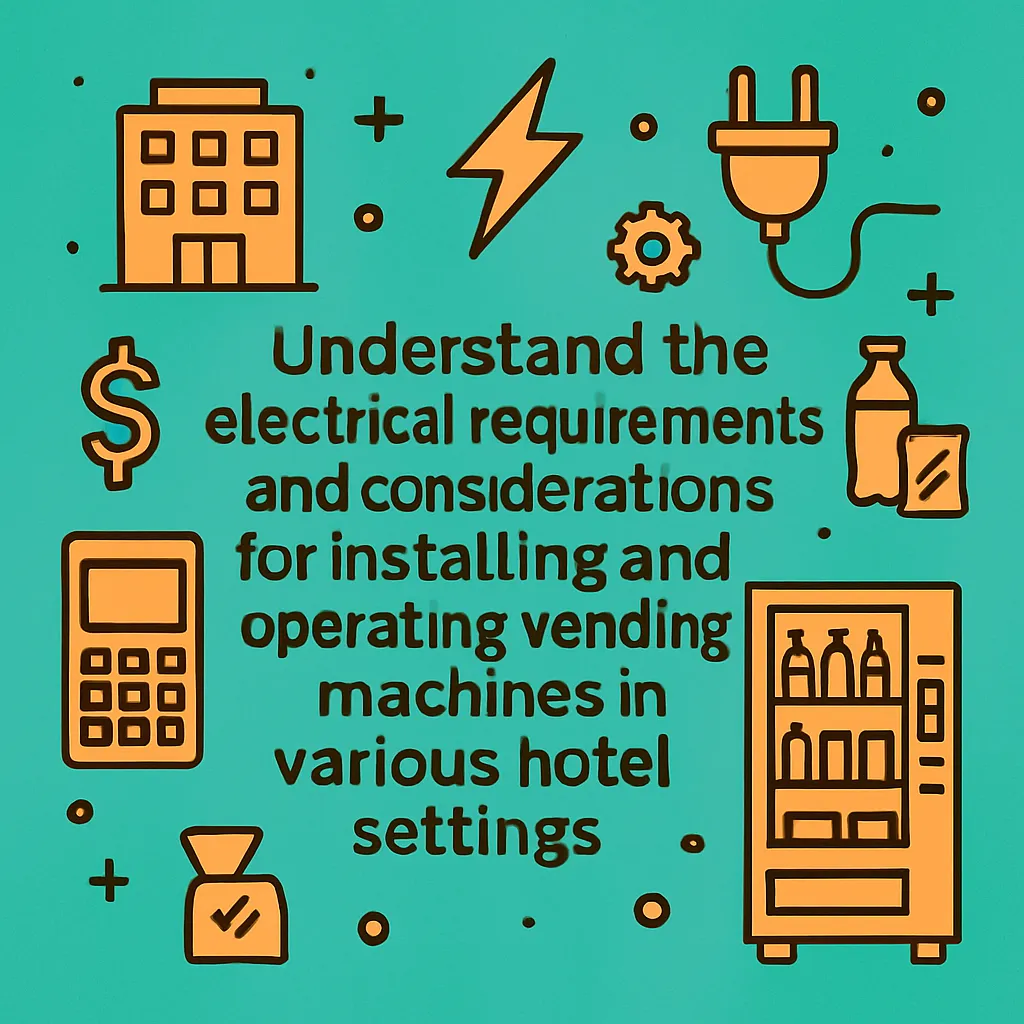Powering Hotel Vending Machines: Electrical Requirements
Understand the electrical requirements and considerations for installing and operating vending machines in various hotel settings.
Back to Vending for Hotels ResourcesUnderstand the electrical requirements and considerations for installing and operating vending machines in various hotel settings.
Back to Vending for Hotels ResourcesProper electrical setup is paramount for the efficient and safe operation of vending machines in hotels, impacting everything from guest experience to energy costs.
![]() Dedicated circuits prevent overloads and ensure continuous service
Dedicated circuits prevent overloads and ensure continuous service
![]() Correct voltage protects equipment and ensures optimal performance
Correct voltage protects equipment and ensures optimal performance
![]() Understanding requirements avoids costly installation delays
Understanding requirements avoids costly installation delays

Integrating vending machines into a hotel environment requires careful attention to electrical requirements. Ensuring that each machine has adequate and appropriate power supply is crucial for its reliable operation, guest satisfaction, and overall safety. This involves understanding voltage, amperage, circuit types, and potential implications for different machine models and hotel locations.
Most standard snack and beverage vending machines operate on a 120-volt electrical circuit and require a dedicated 15-amp outlet. A "dedicated" circuit means the machine is the only appliance drawing power from that circuit, preventing overloads and tripped breakers. For refrigerated units, especially those that dispense cold beverages or fresh food, a 20-amp dedicated circuit might be necessary due to higher power demands for cooling. Failure to meet these basic requirements can lead to frequent service interruptions, spoiled products, and potential damage to the machine.
Hotels looking to upgrade their amenities with AI vending coolers for hotels or full micro-markets will find that these modern solutions often have more complex electrical requirements. AI coolers, for instance, might incorporate advanced cooling systems, interactive screens, and multiple payment processors, potentially necessitating higher amperage or even dedicated circuits for each unit within a micro-market setup. Similarly, coffee vending machines can draw significant power, particularly during heating cycles, and almost always require a dedicated circuit to maintain consistent performance. It is always wise to consult with facilities management or an electrician to confirm existing capabilities before installation.
The location within the hotel also impacts electrical planning. Vending machines placed in guest hallway, lounges, or lobbies typically tap into existing infrastructure, but dedicated circuits are still key. For machines in outdoor areas like pool decks or patios, additional considerations arise. These units require weather-resistant electrical outlets and, critically, must be connected to a Ground-Fault Circuit Interrupter (GFCI) to protect against electrical shocks, especially in proximity to water. Hotels should also consider energy-efficient models to reduce operating costs, as explored in articles like How Much Electricity Does a Vending Machine Use? to ensure sustainability and cost-effectiveness. Proactive planning of electrical needs ensures a smooth installation process and reliable vending operations that enhance guest experience.
Most modern vending machines, especially snack and beverage units, require a standard 120V, 15A dedicated circuit. Refrigerated or combo units might occasionally need a 20A circuit.
Yes, it is highly recommended that vending machines operate on a dedicated circuit to prevent overloading and ensure consistent performance, minimizing disruptions to other hotel equipment.
Plugging into a shared circuit can cause circuit breakers to trip, leading to downtime for both the vending machine and other connected devices. It can also potentially damage the machine or products.
Snack machines typically have lower electrical demands. Beverage and combo machines, particularly those with refrigeration, tend to require more power and often benefit from a 20A circuit.
Yes, micro-markets and AI vending coolers can have more complex electrical needs, often requiring multiple dedicated circuits depending on the number of refrigerated units, freezers, and self-checkout kiosks.
Proper grounding is crucial for safety, protecting both the machine and users from electrical hazards such as shocks, and ensuring the machine operates correctly.
Absolutely. It's essential for hotel staff or facilities management to verify that the proposed installation location has the correct type and capacity of electrical outlet.
Many modern vending machines are designed to be energy-efficient, often carrying Energy Star certification. These reduce power consumption, which can lower a hotel's operating costs.
Outdoor machines need weather-protected outlets and often require a ground-fault circuit interrupter (GFCI) for added safety, especially in pool or high-humidity areas, in addition to standard power requirements.
Typically, the hotel is responsible for ensuring the location meets the necessary electrical specifications before installation. Any required upgrades or modifications are usually the hotel's expense.